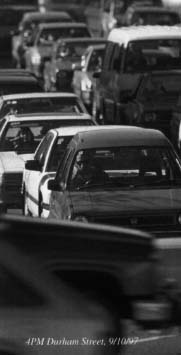| Our Environment: Issue 13 Summer 1997 |
More Cars Spark Pollution and Congestion Problems
| Fewer people catching the bus and more
people driving cars is changing our city. We are starting to see traffic congestion and
associated problems experienced in many other countries. While patronage on the bus system is slowly increasing again, car ownership is growing significantly. Figures reveal:
This growth in car ownership and car use is increasing congestion, especially in the morning and evening peak periods when commuters travel to and from work. All these vehicles are polluting our air. For example, during 1996, carbon monoxide levels from vehicles on Riccarton Road exceeded the World Health Organisation air quality guidelines on one of every three days. This pollution is starting to affect the quality of life for some people and will increase with car use. Christchurch City already has the highest crash rate per person of any New Zealand main centre. The cumulative social cost of crashes in Christchurch is estimated at more than $200 million each year. While this is partially related to the geography and roading network of the city, it is also due to the high vehicle use. As car use increases, so too will the number of accidents and the costs to the community. Providing roads is also costing a lot of money. The City Council spends around $40 million each year on roads. To prevent traffic congestion getting any worse it will need to spend an additional $11.3 million each year for the next 20 years. All this work to provide more roads, widen existing roads and maintenance, is just to keep the city moving, not to make traffic flow any faster. Public transport has great potential to help solve our traffic growth and all the associated implications. Currently only four per cent of Christchurch's work force travel to work on a bus. If that proportion could be increased the trend of increasing peak period congestion could be reduced. Traffic congestion, pollution, crashes, and high costs do not need to become a way of life for Christchurch. |
 |
Stephanie Styles
Assistant Transportation Planner
| Our Environment Index |